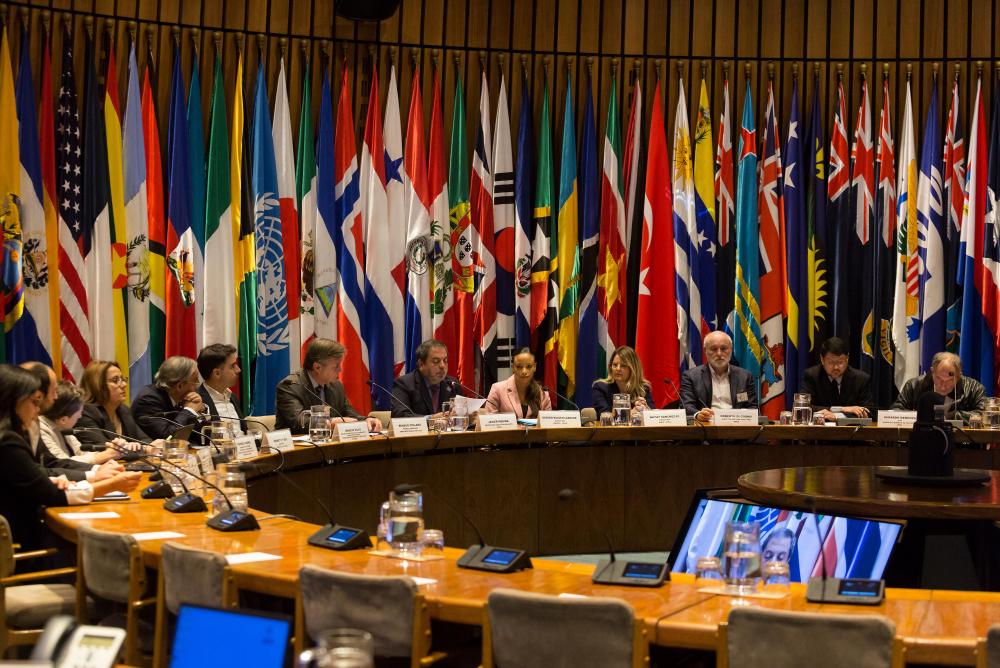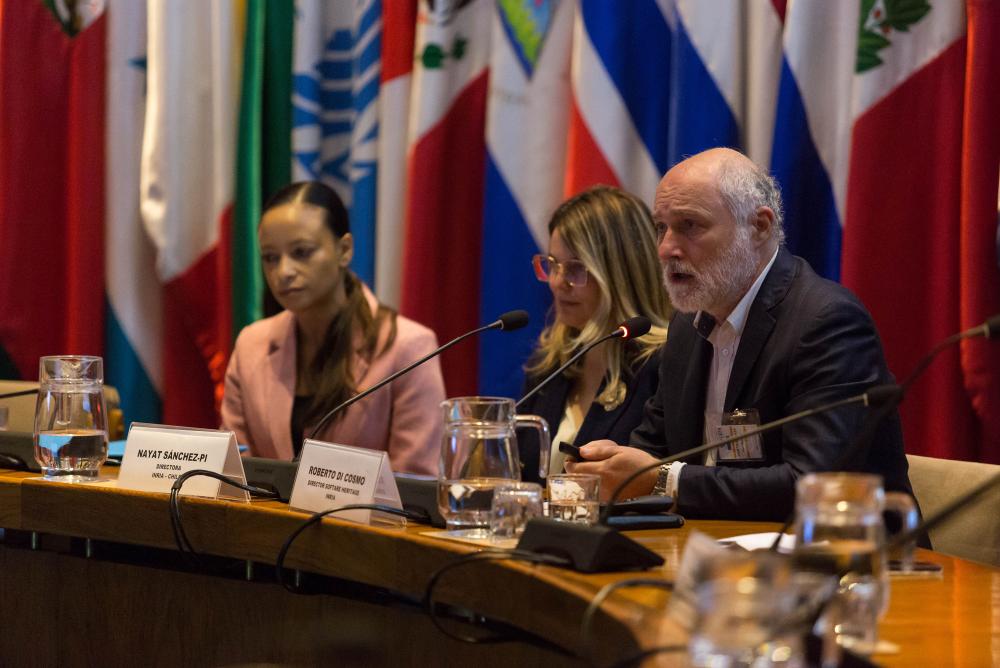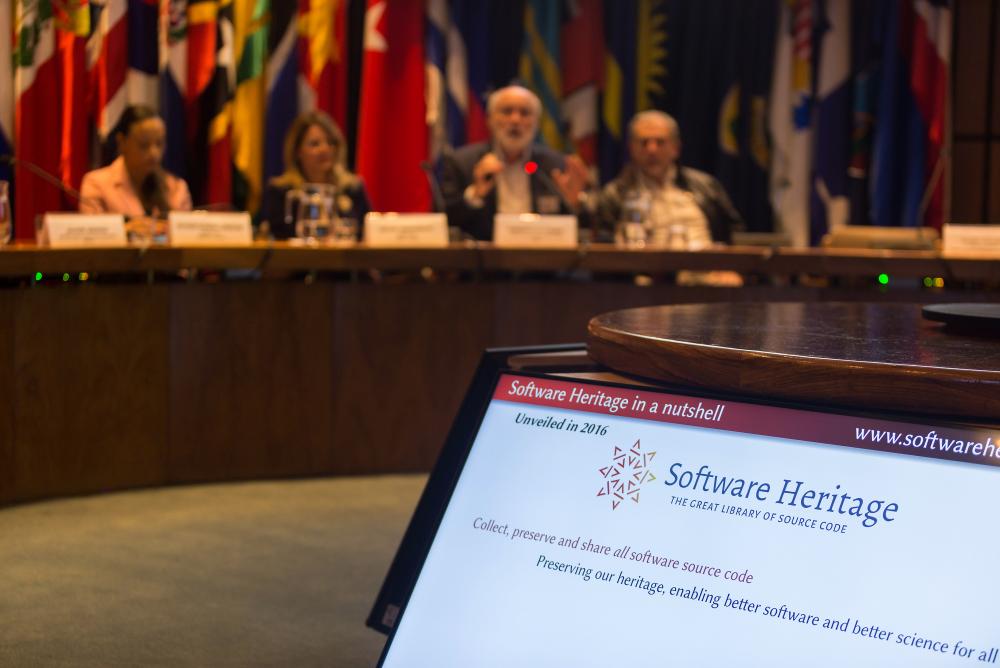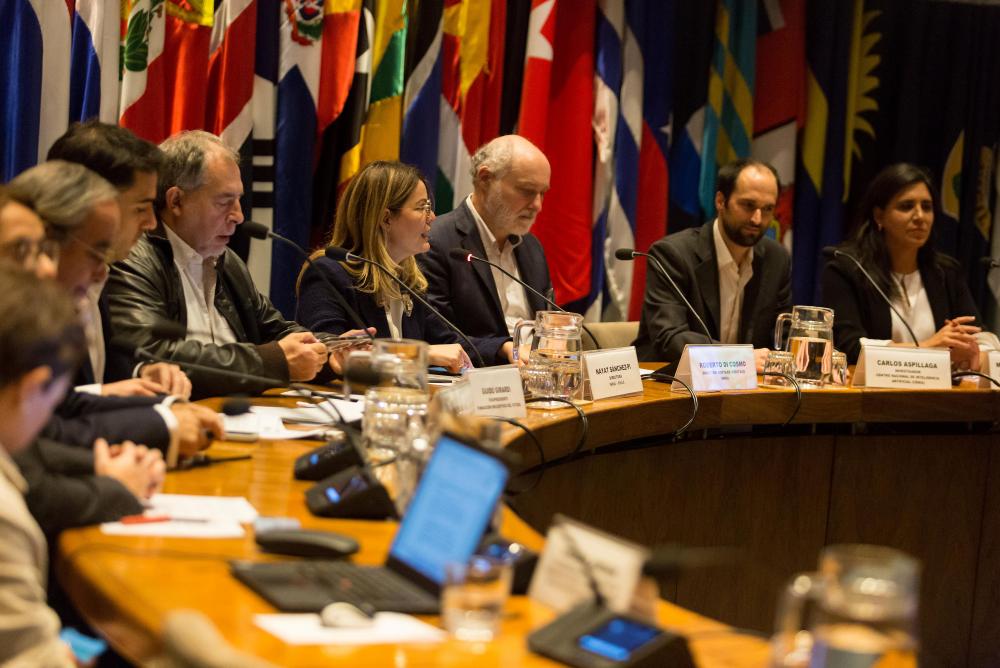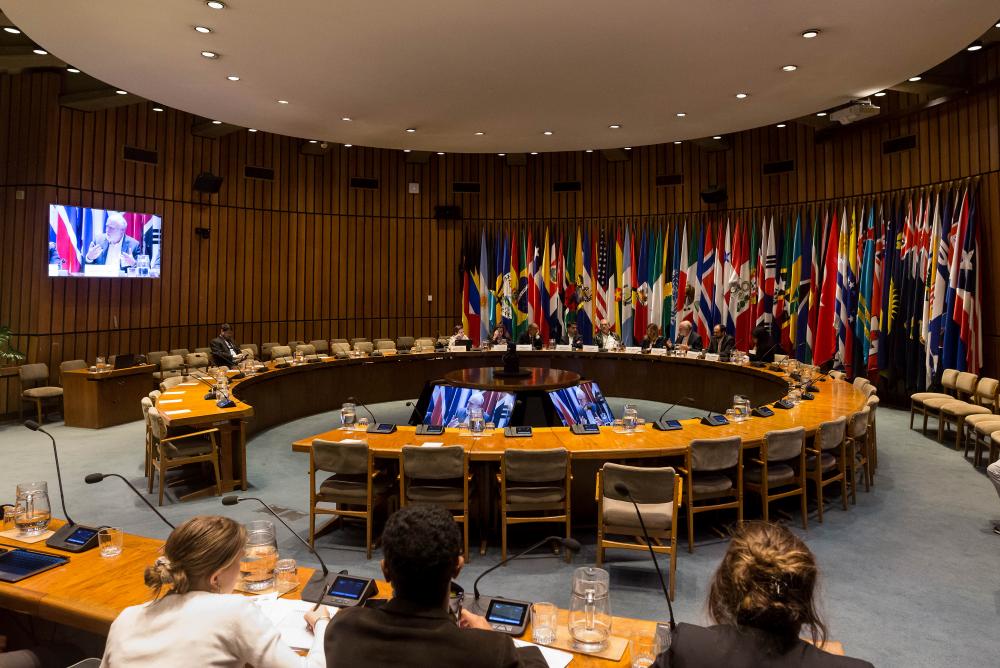- Featuring a keynote address by Roberto Di Cosmo, Director of Software Heritage, the event explored the role of open source as infrastructure for AI transparency and traceability, as well as the many achievements of the initiative in promoting open source for scientific and technological development.
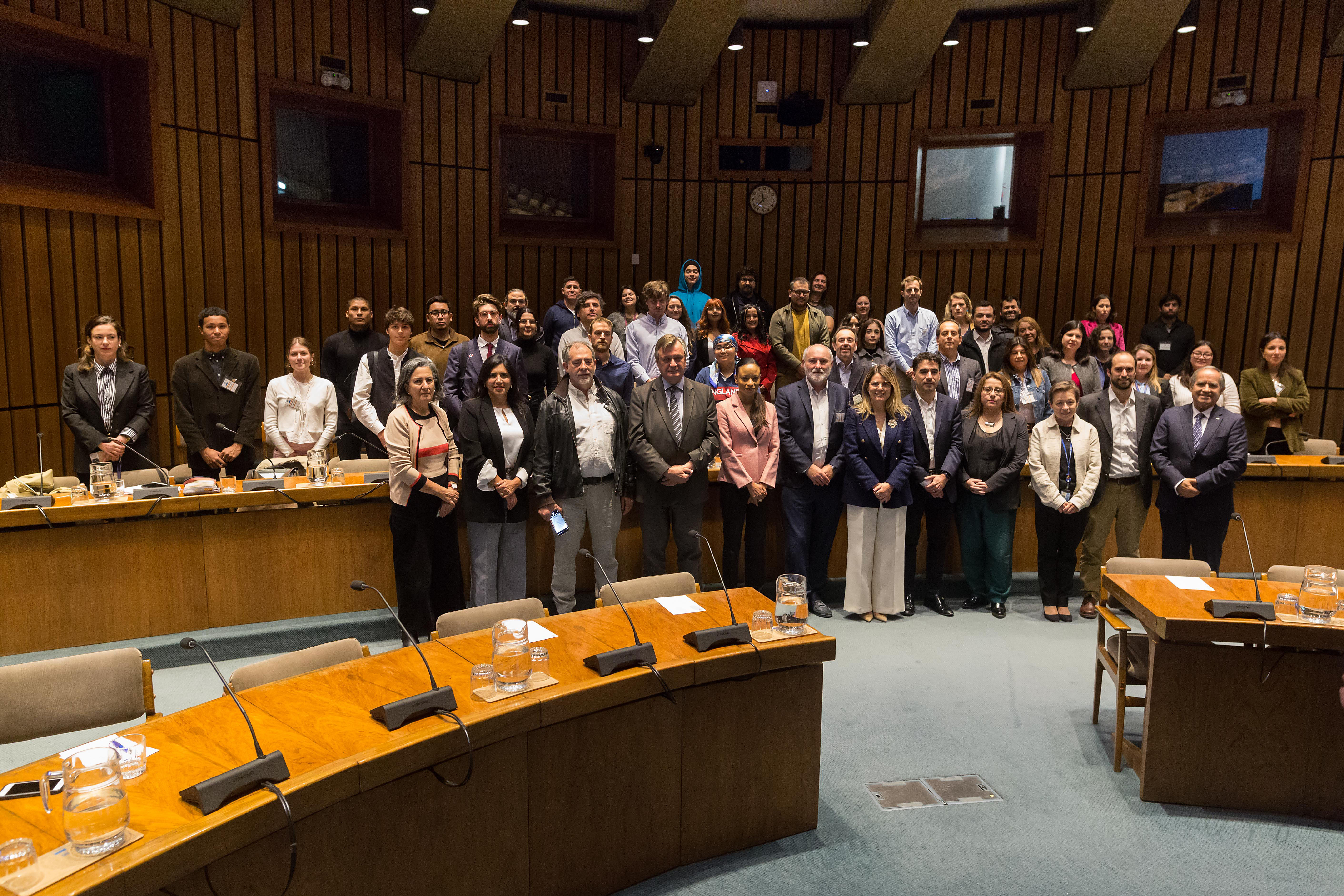
On Wednesday April 9, Inria Chile, in collaboration with the Chilean Ministry of Science, Technology, Knowledge and Innovation and the Economic Commission for Latin America and the Caribbean (ECLAC), hosted the seminar “Open Source for Responsible Artificial Intelligence in Chile.” The event brought together representatives from the public and private sectors, academia, and civil society to reflect on the role of open source as a key infrastructure to support the democratization, traceability, quality, and sustainability of artificial intelligence, particularly in Chile and Latin America.
Open source has become a central component in the development of artificial intelligence (AI), as highlighted at the AI Action Summit held in Paris in February 2025. Its foundational role is increasingly recognized as infrastructure that enables transparent, high-quality, and sustainable AI, while also ensuring traceability and accountability. Furthermore, it serves as a catalyst for democratizing access to AI, driving innovation and advancing the Sustainable Development Goals (SDGs). Since its emergence in the 1990s, open source has regained relevance with the rise of generative AI and large language models, where access to code and data is essential.
The event opened with welcoming remarks from key authorities: Javier Medina Vasquez, Deputy Executive Secretary of ECLAC, highlighted regional efforts to advance digital democratization; Renaud Collard, First Counselor at the Embassy of France in Chile, emphasized the importance of scientific cooperation; Esther Kuisch Laroche, Regional Director for Latin America and the Caribbean at UNESCO, reaffirmed the organization's commitment to responsible AI and digital commons; Ignacio Silva Santa Cruz, Head of the Division for Emerging Technologies at the Chilean Ministry of Science, Technology, Knowledge and Innovation, presented Chile’s strategic vision for AI and its privileged cooperation with France in this area; and Nayat Sánchez-Pi, Director of Inria Chile and the Franco-Chilean Binational Center on Artificial Intelligence, framed the seminar around the shared French-Chilean vision on open source and responsible AI, before giving the floor to keynote speaker Roberto Di Cosmo, invited by Inria Chile for the occasion.
Roberto Di Cosmo, of Software Heritage and Inria, delivered the keynote presentation “Software Heritage: A Revolutionary Infrastructure for Open Science and Open Source,” where he outlined Software Heritage’s goals as a global, nonprofit infrastructure. He highlighted its capabilities to archive, preserve, and share public source code using Software Heritage Persistent Identifiers (SWHIDs), and its utility as a tool for software development exploration, with key applications in open science, cybersecurity, and ensuring transparency in AI.
Di Cosmo said: "At Software Heritage, what we aim to do is preserve and grow a space that offers an alternative to monopolized ecosystems—one where, by working together openly, we can aspire to build something comparable to, or even better than, what’s controlled by private or highly specialized entities."
In this context, Di Cosmo emphasized that the mission of Software Heritage, driven by Inria and UNESCO, is to collect, preserve, and share source code on a global scale. Since its inception, the initiative has built the world’s largest archive of publicly available source code, hosting more than 22 billion source files from over 340 million projects as of 2024.
Roberto Di Cosmo’s Agenda in Chile
Roberto Di Cosmo, from Software Heritage and Inria, conducted a four day visit to Santiago, organized by Inria Chile, as part of the recently established Franco-Chilean Binational Center on AI and the launch of concrete actions following the Paris AI Action Summit. During his stay, Di Cosmo presented the vision and ongoing work of Software Heritage since its inception.
- Talk at the Faculty of Physical and Mathematical Sciences, University of Chile: At an event organized with the Data and Artificial Intelligence Initiative (IDIA) and the Department of Computer Science, Di Cosmo delivered the talk “From Software Heritage to Code Commons: A vision for transparent and responsible AI in code based model training,” where he highlighted the crucial role of Software Heritage in research and software development. He also presented the objectives of the CodeCommons project to the attending faculty members and students. The talk is available here.
- Seminar “Open Source for Responsible AI in Chile”: This event, organized by Inria Chile in collaboration with the Chilean Ministry of Science, Technology, Knowledge and Innovation and ECLAC, brought together authorities, researchers, policymakers, and industry representatives. The discussion focused on the future of open-source software as a fundamental infrastructure for responsible AI.
- Advancing Dialogue on Science and Open Source with ANID: Di Cosmo, together with Nayat Sánchez-Pi, held a meeting with Patricia Muñoz, Deputy Director of Networks, Strategy, and National Knowledge at ANID, and her team. The discussion centered on the formal recognition of research software as a first-class research output. French examples were presented, such as the National Open Science Award for Research Software and the use of persistent identifiers like SWHIDs. Synergies were explored with ANID’s Access Unit to include source code in national repositories using the Software Heritage archive.
Roberto Di Cosmo’s visit to Chile was marked by a week of meaningful dialogue with key stakeholders in science, technology, and policy. It contributed to promoting the role of Software Heritage in software preservation, the advancement of open science, and the development of responsible artificial intelligence in Chile and across Latin America.
Experts Discuss the Role of Open Source in the Future of AI
During the event, Nayat Sánchez-Pi moderated the panel titled “Open Source: A Key Challenge for the Development of Responsible Artificial Intelligence in Chile”. The panel featured: Carlos Aspillaga, Researcher at the National Center for Artificial Intelligence (CENIA); Roberto Di Cosmo, Director of Software Heritage, Inria; Valeria Jordán, Coordinator of the Digital Development Observatory and the eLAC AI Working Group at ECLAC; Patricia Muñoz, Deputy Director of Networks, Strategy and National Knowledge at the Chilean National Research and Development Agency (ANID); Guido Girardi, Executive Vice President of the Fundación Encuentros del Futuro; Kenneth Pugh, Senator of the Republic of Chile; Ignacio Silva Santa Cruz, Head of the Emerging Technologies Division at the Ministry of Science, Technology, Knowledge and Innovation of Chile; and Marina Tannenbaum, representative of ACTI (Chilean Association of Information Technology Companies) and ICARE (Chilean Institute for Rational Business Administration).
The panelists emphasized the crucial role of open source as a foundation for software development and its value as a data source for AI model training. They highlighted its importance in shaping public policies that facilitate access to and the democratization of artificial intelligence, as well as its contributions to transparency, traceability, and the practical application of this technology. The discussion also explored open source’s potential to foster digital sovereignty and economic development, along with the urgent need to invest in talent development and the creation of diverse teams to ensure inclusive and responsible AI progress. At the same time, the speakers called for the modernization of institutions to keep pace with the rapid evolution of technology.
Verbatim
When it comes to artificial intelligence, I believe our region needs a more open, inclusive, and collaborative approach. International cooperation is essential, given the global nature of AI. In this regard, one critical yet often overlooked aspect is the promotion of open science and open source. The exponential growth of AI has been made possible largely due to the open-source model embraced by both the scientific and business communities.
Director Inria Chile / Director Franco-Chilean Binational Center on Artificial Intelligence

